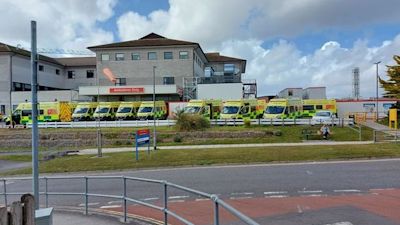Paramedic claims it's a 'dangerous time' to be ill in Cornwall as ambulance service at crisis point

An ambulance worker has said it's a "very dangerous time to be seriously ill" in Cornwall, claiming the county's healthcare system is at crisis point.
The ambulance worker contacted Cornwall Live anonymously in responce to reports of ambulances backed up outside the A&E department at the Royal Cornwall Hospital in Truro.
"Experienced paramedics with many decades of service have never seen it this bad," said the South Western Ambulance Service (SWASFT) employee.
They said there are times when "nearly all" of Cornwall's ambulance resource is in a queue at the Royal Cornwall Hospital, still commonly known as Treliske.
In response to the claims, the ambulance service and hospital trust said a "significant rise in demand" in recent weeks has meant healthcare services are busy. They urged people to call 111 for non-emergency care but said they remain available for those in need.
The worker said crews are routinely missing breaks and working hours past the end of their shift, adding: "The ambulance crews' morale is rock bottom with many questioning if they can go through another summer of the endless queueing and late finishes.
"The crews are tired and disillusioned; they want to do the very best for their patients but are unable while they sit in the queue at Treliske. The ED [emergency department] staff and the hospital staff work long hours too, trying to cope with this summer pressure, but are under-resourced. The hospital is too small and it is everyone that suffers."
The worker said they believe a major incident should be declared, claiming the ambulance service is being used to increase hospital capacity.
"The ambulances have become an extension of the hospital and this greatly frustrates the crews who do not believe that this is their role," they said.
"We are beyond breaking point and this warning goes out before the summer holidays begin."
The ambulance worker said ambulances queuing at the hospital are unable to respond to other calls, adding: "This does not stop the 999 and 111 calls being received by control and these jobs then start to stack up awaiting an ambulance.
"Patients are now waiting considerable amounts of time for an ambulance to arrive, often many hours after their original call."
Ambulances left queuing outside Cornwall hospital as health services on high alert
Royal Cornwall Hospital NHS Trust told to 'make improvements'
The SWASFT employee added: "The hospital does not have the bed capacity for the increase in Cornwall's population during the summer. It takes in patients through ED and moves them into the wards in the hospital. The only way to take more patients into ED is by moving on the patients in to the wards.
"This pressure on beds can result in an early discharge. The ambulance service are now attending patients that have only just been discharged from hospital and have called 999 or 111 on return to their homes."
The hospital is urging people to make the best decision when needing medical care.
A spokesperson for the trust explained the hospital is there if emergency care is needed - such as in life-threatening or life-changing situations - but for anything which is urgent but not an emergency, people should call 111.
She said: "The hospital is busy but our services remain available for anyone who needs them.
"Call 999 if it is a life or limb emergency and for urgent care, anything that cannot wait until the morning but is not an emergency, call 111 or contact your GP."
A spokesperson for Cornwall and the Isles of Scilly’s health and care system told ITV News West Country: “The health and care system is very busy, having seen a significant rise in demand during the past few weeks as lockdown restrictions ease, people visit Cornwall and start venturing outside.
“Ambulance and hospital staff continue to focus their main efforts on those in greatest need, as we do every year as the summer season gets under way. We’re also working hard to get patients who are ready to leave hospital back home as quickly as possible.
“What always helps is if people with non-emergency conditions call 111 first, so they can be pointed to the right treatment, rather than adding to the pressure at A&E.”
Read more: